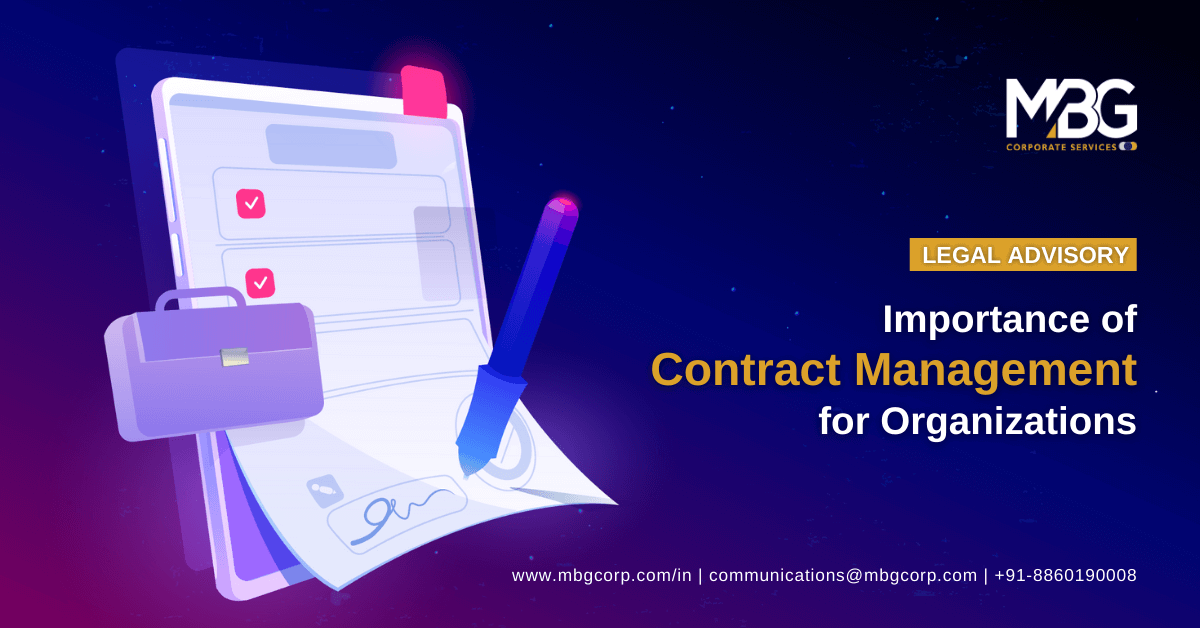Importance of contract management for organizations
January 20, 2022

“What is Contract Management?, “What is the Contract Management Process?” , “Why do I need Contract Management Services?” , “ What are the benefits of Contract Management?”– these are questions we hear often. This article answers these questions and elaborates on the nature and role of Contract Management and Contract Management Services, the types of Contract Management, and why Contract Management is important.
What is contract management?
A business entity enters into and carries out several agreements with other entities such on a regular basis over the course of its operational life. Be they with suppliers, customers, employees, business associates, and partners, or other second parties, typically these agreements are, or should be, documented and signed contracts to minimize the risks of the other party not honoring them and to ensure they are executed well on the agreed terms.
Contract Management is the process of managing a contract in terms of its creation, development, implementation, modification, and analysis with the objectives of boosting operational performance and efficiency while minimizing financial risk. What is Contract Management essentially, therefore, is a system of procedures to ensure the effectiveness, enforcement, and efficiency of a contract.
Contract Management: The fundamentals
A contract clearly lists out the work, job, or activities that the second party – vendor, customer, employee, or some other, as the case may be - has agreed to undertake in return for payment by the first party for the goods or services rendered. Both parties are therefore obligated to fulfill their respective commitment as per the agreed terms.
Commercial / Financial Contracts have a direct bearing on financials. Indeed, a contract can be seen as a financial document in that it governs the revenues of the ‘Seller’ (supplier, customer, employee, second associate) and the costs of the ‘Buyer’ (customer, supplier, employer, and first associate). Each side must think through the terms of the contract carefully to maximize its own benefits and minimize the risks. It entails one side minimizing cost and maximizing performance, and the other side maximizing revenues and cash flow. Fundamentally, thus, what is Contract Management can be seen as the process of mitigating the financial risks of these outcomes not occurring for the party engaged in the Contract Management.
Wording given the above implications on financial performance, the wording is a crucial part of the contract. The terms of the contract - deliberated over internally, negotiated with the other party, and agreed mutually - must be phrased clearly and leave no ambiguity. Businesses can incur financial losses from incorrect or disadvantageous wording in the contract.
Legal Right wording/drafting, in turn, implies the value of legal input into contract drafting. Hence the involvement of the company’s legal department or lawyers is an important part of managing a contract, especially high-value ones. The role of legal is not restricted to correct, precise and advantageous wording. It also encompasses execution and enforcement as well as dispute resolution.
The stages and types of contract management
There are typically three stages of Contract Management as follows:
- Pre-award stage: The work done before a contract is given to the second party, e.g., a supplier. This includes inputs into the contractual terms based on an assessment of the work.
- Middle stage: When the contract is handed to the second party. This includes paperwork and other procedures related to the finalization of the agreement
- Post-award stage: Contract execution and maintenance as the work is implemented.
These are not cast-in-stone separate stages, and the process is more complex than this classification. However, these are both common and useful classifications to approach what is the Contract Management Process.
There are several different types of contracts that are covered under Contract Management. The three most common types are:
- Fixed-price Contracts: usually come into play where there is a well-defined scope of work. The seller provides a formal proposal covering the total cost, work timelines, and other details based on detailed specifications of the work briefed by the buyer. Buyers minimize the risk of cost overruns in this form of contracts as they know the cost from the start. Payment of the total cost is usually made at the end of the job (which is why Fixed-price contracts are also referred to as ‘Lump Sum’ contracts) unless smaller amounts are paid at intervals when the project duration is long. Sellers bear most of the corresponding risk.
- Cost-plus Contracts: reimbursement-based contracts where buyers pay sellers for the cost of labour, materials, overheads, or any other cost of producing the work (up to a contractually agreed cost limit, or as buyer-approved) plus a fixed percentage. In these contracts, the total cost is not known in advance but can fluctuate during the life of the project. This is a risk the buyer has to take, along with the challenge of tracking actual time and material used.
- Time and materials contracts: often used when buyers do not have a clear idea of their requirements and sellers do not have advance estimates of time and/or material. With time and materials contracts, in this case, sellers charge for the cost of materials and labour time, with the rates being set down in the contract and recorded and shared at regular intervals. Risks are more evenly balanced between buyers and sellers in these contracts.
There can also be a combination of two or more of them, such as Fixed -price for labour and Cost-plus for the material. As stated above, there are also numerous and varied other types of contracts and contractual agreements apart from the top three; for example, employment contracts, confidentiality agreements, lease agreements, rental agreements, asset purchase agreements, partnership agreements, etc. to name just a few. Correspondingly, there are therefore different types of Contract Management that come into play.
What remains firmly established though is the need for and importance and benefits of Contract Management to both parties in extracting the best from a contract, whichever be the type.
Why contract management is important: The benefits of contract management run deep
Why Contract Management is important follows directly from the financial implications of contracts and the need therefore to manage them effectively (that being the nutshell meaning of what is Contract Management). The benefits of Contract Management in maximizing favorable outcomes and minimizing risks hold across every stage and all types of Contract Management.
At the creation and conception stage, selecting the right contract type based on expert in-depth knowledge and understanding not only of contracts but also the client’s business and the project is a vital part of Contracts Management Services and what is the Contract Management Process?. In combination-type contracts, it determines the best mix of component types. Across types, it ensures the contract is on solid legal ground and holds its own in court. Effective Contract Management can create valuable and enduring business associations contributing both to profitability and long-term growth.
These are only a few of many reasons why Contract Management is important. The benefits of Contract Management extend across functions including finance, sales, operations, IT & Systems, and HR.
Now, given its importance in a business world of an increasing number of products and services and the growing volumes of transactions accompanying them coupled with the fact that companies are pressed for time, cost reduction pressures, and greater productivity and efficiency of resources, it is no wonder that Contracts Management Services have grown by leaps and bounds. The need for a support system of experienced professionals in Contract Management has never been greater.
The key benefits of Contract Management Services can be summarized as follows:
- Mitigation of financial and operational risks: Enforcement of the contract and operating on its agreed terms improves overall controls and compliances. For buyers, the risks of suboptimal purchases, overspending, and supply chain risks are markedly lowered. Effective Contracts Management Services validate and vet the supplier onboarding process and help identify high-risk zones such as those in violation of laws and regulations or located in high-risk geographies.
- Superior operational performance: Strong Contracts Management Services boost operational effectiveness and efficiency. Digitization and automation of many of the steps that essentially comprise what is the Contracts Management Process - such as alerts and reminders to track work status and obligation deadlines, documentation repositories, and process automation yields productivity gains and enhanced workflows. Work is typically completed on or within time and without cost overruns. The use of data and analytics on tracking project milestones leads to better forecasts. And through the smoother and timely discharge of obligations, whether timely task completion by the seller and payment from the buyer, leads to better business relationships.
- Enhanced financial management and performance: The financial benefits of Contract Management Services are perhaps the most significant. To begin with, ensuring the most optimal terms such as price or timelines and their timely realization contribute to bottom-line performance. By taking a comprehensive view of ongoing performance and organizational needs, effective Contract Management optimizes the supply chain to reduce waste. It also improves overall cost and cash flow management through automated processes and by constant monitoring both of out-and inflows as well as of terms like volume rebates, etc. Linking procurement with the systematic process of what is Contract Management has been proven to generate and help retain a higher portion of savings. Importantly, Contract Management also reduces legal costs.
These benefits thus deliver a significant advantage to businesses in today’s world. Typically, the ROI from engaging Contracts Management Services is positive and high.
Reaping the benefits of contract management with MBG’s contracts management services
At MBG Corporate Services, our dedicated team of experts provides Contract Management support services to our client companies’ legal, sales, operations, finance, procurement, and HR departments, thereby helping them maximize create healthy and beneficial relations in and outside the organization.
At MBG, our portfolio of Contract Management Services includes:
- Shareholders and Share purchase Agreement
- Joint Venture Agreement
- Business Association/ Partnership Agreement
- Drafting policy for Prevention of Sexual Harassment committee
- Legal Notices
- Vetting of Agreements/Contracts
- Other operational and commercial agreement









